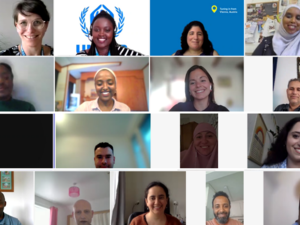UNHCR welcomes the roll out of new 'Single Procedure' to accelerate asylum applications
UNHCR welcomes the roll out of new 'Single Procedure' to accelerate asylum applications
UNHCR has welcomed the introduction of long promised new procedures to accelerate applications for asylum. The system, which UNHCR first called for in 2008, will mean Ireland will join other European Union (EU) Member States in having a streamlined process for assessing asylum applications. This should dramatically cut the length of time asylum-seekers spend in direct provision centres.
“The new procedure should speed up decision making and reduce the amount of time asylum-seekers spend in direct provision centres” said Enda O’Neill, Head of Office with UNHCR Ireland. “Focus on Direct Provision should not relate solely to accommodation and living arrangements of asylum-seekers but to the determination process that means they spend long periods of time waiting for decisions on their applications. Quick recognition of those in need of protection will ensure shorter durations in state reception centres.
At present, asylum-seekers must navigate a multi-layered process that can lead to long times spent in Direct Provision waiting for decisions. Under the new ‘Single Procedure’ system, asylum-seekers will make one application, which they may appeal once. This streamlined process should dramatically accelerate the length of time it takes to reach final decisions on applications for protection. The new procedure was commended on 31 December with the commencement of the International Protection Act, with the first applications to be processed under it from Tuesday 3 January.
However, UNHCR stated that it was disappointing that there has been no significant reduction in the number of cases awaiting processing in 2016. According to figures from the Department of Justice, there were 4,740 asylum-seekers waiting for a decision at the end of 2015 compared to 3,701 at the end of 2014, with no significant decrease on those numbers expected in 2016. This means that the new procedure will start with a considerable backlog that could detract from the overall benefits of the new procedure.
“UNHCR urges the government to ensure there are sufficient resources allocated to bring overall processing times down over the next 12 months” added O’Neill. “Timely appointments and sufficient allocation of staff resources are needed to ensure that the new appeals tribunal will be in a position to hear the considerable caseload likely to come to it.”
UNHCR understands that applicants who are currently in the system may be worried about the consequences for them of having their applications determined under the new procedures. However UNHCR is encouraged that existing personnel and processes will be carried over to the new determining bodies in line with recommendations contained in the 2015 McMahon report.
“We are confident that the positive trends seen in recent years in terms of providing training to staff and the focus on quality decision making will be carried over to the new procedure” said O’Neill.




